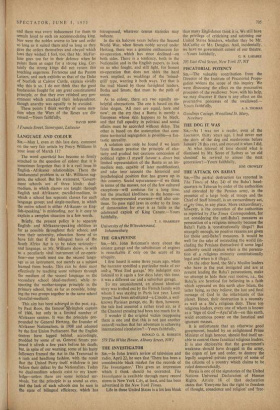LANGUAGE AND COLOUR
SIR,—May I, even at this late date, comment on the very fair article by Penry Williams in your issue of March 11?
The word apartheid has become so firmly attached to the question of colour that it is sometimes forgotten that it is a real issue in English - Afrikaner relationships. There the fundamental problem is, as Mr. Williams sug- gests, the school. But his statement, 'Govern- ment schools arc of three kinds : dual- medium, in which classes are taught through English and Afrikaans; parallel-medium, in which a school has separate classes for each language group; and single-medium, in which the entire school is either Afrikaans- or Eng- lish-speaking,' is misleading, nor is it easy to explain a complex situation in a few words. retrogressed, whatever census statistics may indicate.
In the six halcyon years before the Second World War, when Smuts nobly served under Hertzog, there was a genuine enthusiasm for co-operation which has since declined—on both sides. There is a tendency, both in the Nationalist and in the English papers, to look on us who fought, and still fight, for honest co-operation that does not shirk the hard work implied, as weaklings of the 'mixed- grill' type, wanting it both ways. Yet that is the trail blazed by those farsighted leaders, Botha and Smuts, that must be the path of union.
As to colour, there are two equally un- helpful obstructions. The one is based on the false slogan, 'All men arc equal, here and now'; on the cry , that a Bantu is merely a European whose skin happens to be black, and that full equality in political and social affairs must be accorded without delay. The other is based on the assumption that com- plete territorial segregation is possible—a fan- tastic unreality.
A solution can only be found if we learn from Roman practice the principle of elas- ticity and gradual but cautious concession of political rights (I myself favour a direct but limited representation of the Bantu as an im- mediate step, capable of later modification). and take into account the historical and psychological position that has grown up in this country. Social separateness—if we think in terms of the masses, not of the feW cultured exceptions—will continue for a long time, but the practical kindliness in the home—so often misrepresented overseas—will also con- tinue. To pass rigid laws in order to fix lines of demarcation for ever is as futile as the celebrated exploit of King Canute.—Yours faithfully,
T. J. HAARHOFF
University of the Witwatersrand. Johannesburg


































 Previous page
Previous page